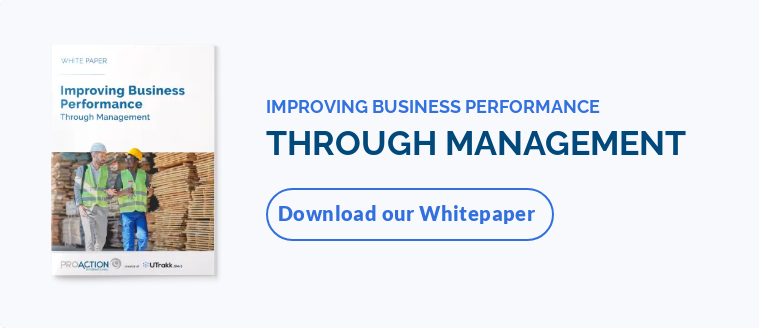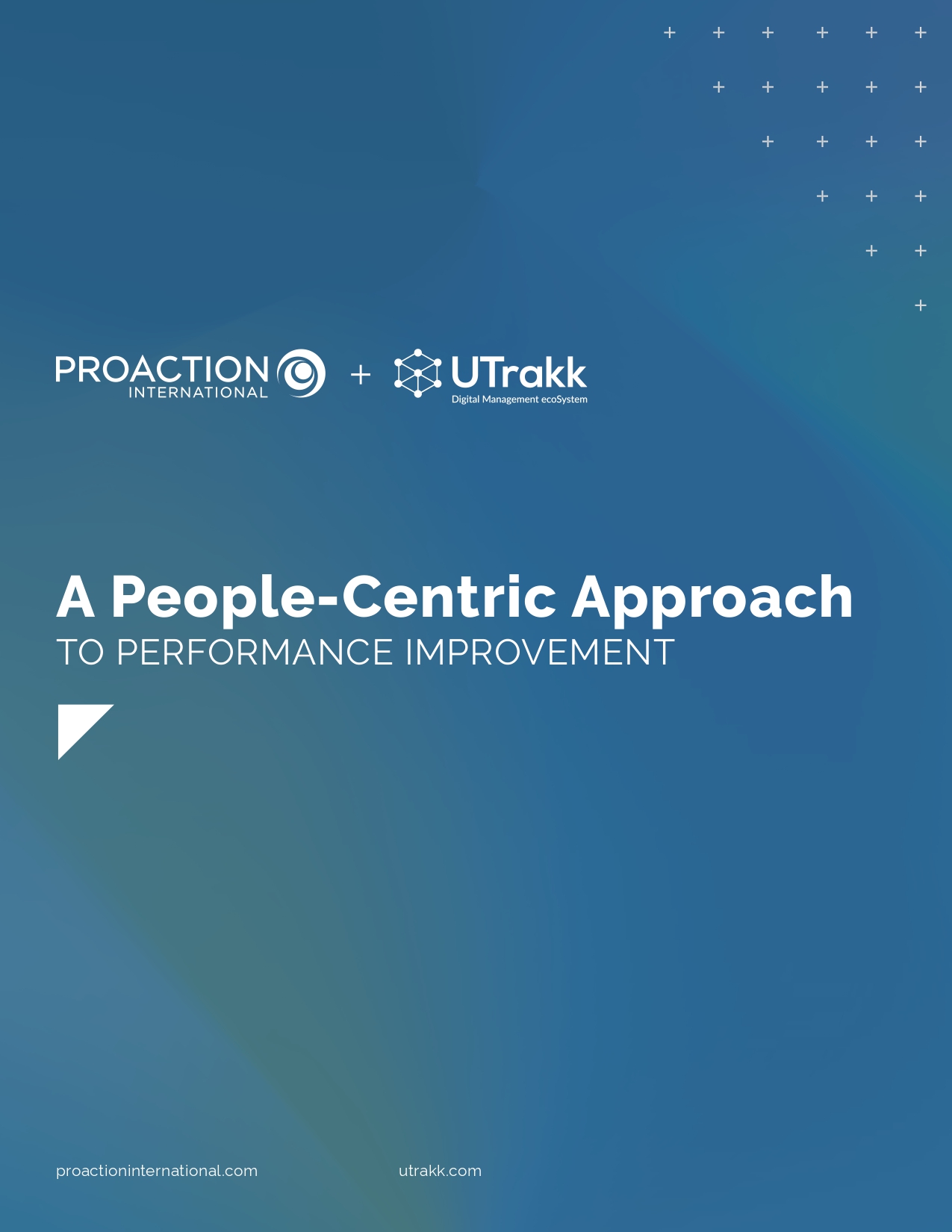Shifting motivations for new generations and evolving roles for managers
New employee motivations
For new generations of workers, the simple prospect of job security is no longer enough. A "good job" no longer rhymes with salary and stability. Today's Millennials and Generation Z are looking for personal and professional satisfaction. Above all, they expect a meaningful job that helps them grow and motivates them daily.
From Gallup's point of view (It's the Manager), there's a clear difference between a "good" and a "great" job for frontline employees:
- A "good job" is full-time, with a contract of 30+ hours a week and a living wage paycheck.
- A "great job" has all the qualities of a good job but with one big differentiator: employees are engaged in meaningful and fulfilling work and feel they are experiencing real individual growth and development in the workplace.
The changing role of the manager
Millennials and Generation Z don't want bosses; they want coaches. - Gallup, It's the Manager
Faced with these new motivations, frontline managers must get rid of their role of autocratic leaders. The old management practices of "give orders and they will be carried out" may still be in use in many organizations, but they don’t meet today's standards and risk negatively impacting these companies.
The frontline manager must change and adapt to combine the traditional roles of a manager with those of a coach. Their aim is no longer to exclusively supervise frontline employees and new hires; they must also accompany them, support them, help them develop their strengths, achieve their goals, and inspire them to give their best.
They must also be able to see the members of their group as employees and as people in their own right.
The 6 top challenges faced by frontline managers
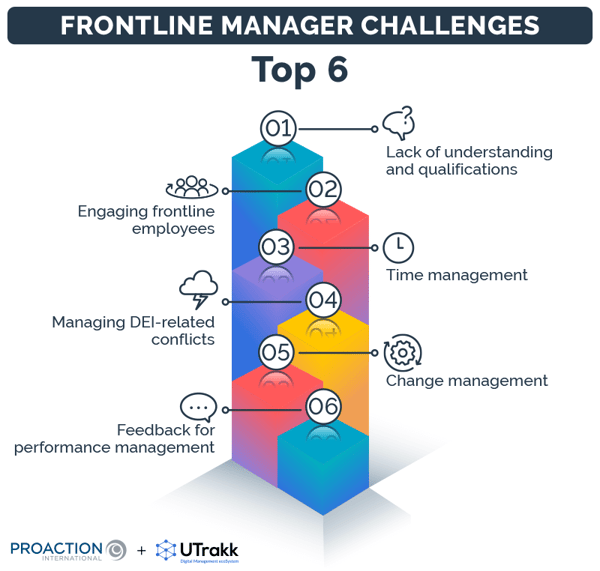
1. Lack of understanding and qualifications
Many frontline leaders (plant managers, store managers, regional managers, senior leaders, etc.) fear they are not sufficiently qualified.
Currently, most employees promoted to the manager title do so because they were successful in their previous, non-managerial position, or because of their seniority in the company. Many are placed at the head of a group, then left under-supported and have to fend for themselves. Therefore, they begin their leadership journey without knowing what to do and how to act.
However, being a long-serving frontline employee or an excellent individual contributor does not necessarily mean being a good manager – therein lies the nuance. Leading a field team requires experience, specific skills, and an understanding of the manager's role.
Billions of dollars are spent every year on manager development. Yet Gallup finds that only 1 in 3 managers strongly agree that they have had opportunities to learn and grow in the past year. - Gallup, It's the Manager
The solutions
Senior management and human resources must act by:
- Clarifying the manager's role and expectations from the outset.
- Properly supporting and empowering the frontline manager.
- Investing in developing the skills of their frontline managers and providing them with the resources they need to succeed.
There are various ways of solving this problem, including coaching and training. These two valuable tools enable the frontline manager to grasp what their role as manager 4.0 entails and acquire the knowledge and the right reflexes to manage their team and develop their employees' strengths effectively.
2. Engaging frontline employees
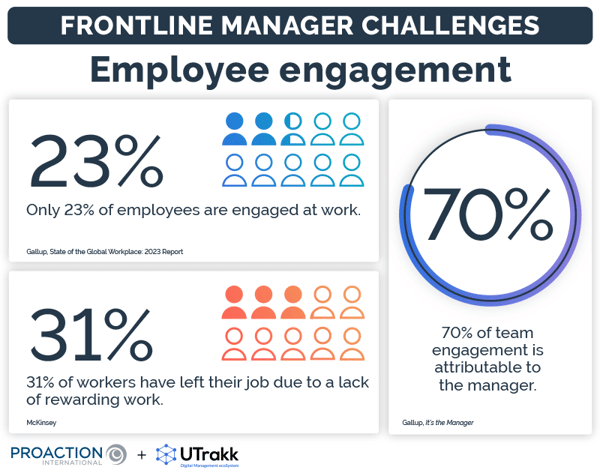
Employee engagement is one of the most critical challenges facing frontline managers today, as it directly influences productivity and, ultimately, the success of a business.
As we saw earlier, the modern workforce now wants to thrive at work, to have a sense of purpose, and to be invested in the company's vision. Direct reports want to be listened to feel valued, have responsibilities, and know they contribute to the company's success.
An engaged employee is more motivated, productive, and likely to stay with the organization long-term. However, several factors make this commitment challenging to maintain:
High expectations and a quest for meaning
New workers, Millennials and Generation Z specifically, have high work expectations.
Frontline managers need to be able to integrate these expectations into the way they lead their teams. They must help the frontline employees understand how their work contributes to the company's broader objectives and positively impacts the business.
Decrease in employee loyalty
Today's employees tend to be less loyal to their employers. They are more inclined to seek new opportunities if their job doesn't suit them.
Frontline managers need to be aware of signs of dissatisfaction and identify strategies to retain talents. It includes regular check-ins and discussions on career opportunities, training programs, and professional development paths.
A need for communication and transparency
Open, transparent communication is essential to mobilize frontline employees. Managers must facilitate dialogue within their teams and between senior leaders and other organizational hierarchical levels.
The frontline workforce needs to understand the company's objectives, the internal changes that are occuring, and how they contribute to overall success.
The solutions
Collaboration with human resources departments helps shape a work environment that makes employees want to stay and perform. HR can:
- Offer training and coaching programs for frontline managers.
- Set up employee engagement assessment systems (surveys, individual interviews, key performance indicators, etc.).
- Provide advice and resources to help frontline managers resolve employee engagement issues.
- Develop programs to motivate and engage employees (benefits, professional development opportunities, recognition and reward programs, etc.).
3. Time management
Time management is a constant challenge for frontline managers. They must balance delegating tasks, leading people, and maintaining a supportive and motivating environment.
Too much emphasis on tasks can lead to employee disengagement. But, on the other hand, prioritizing people and forgetting tasks is detrimental to productivity. All this can quickly lead to a stressful leadership journey.
The solutions
To prevent this from happening, frontline managers need to adopt proactive time management and organization.
Good time management requires:
- Task planning and prioritization;
- Time dedicated to management responsibilities (performance reviews, one-on-one meetings, objective assessments, etc.);
- The use of time management tools;
- The ability to delegate;
- Anticipating problems to better solve them.
The growing need for employees to be able to balance work and personal life also has an impact on time management. It requires frontline managers to try to be as fair as possible when it comes to enabling employees to fulfill both their professional obligations and personal needs.
It calls for greater flexibility in working hours, effective management of leave and absences, and excellent communication skills, with a healthy dose of empathy and emotional intelligence towards the individual needs of each employee.
4. Managing DEI-related conflicts
- 27% of working Americans report that they have been a victim of sexual harassment. (Gallup, It's the Manager)
- Only 21% of employees strongly agree with the statement that their organization is committed to developing each employee's strengths. (Gallup, It's the Manager)
- 21% of employees disagree or strongly disagree that their employer would do the right thing if they raised concerns about ethics and integrity. (Gallup, It's the Manager)
Conflicts around diversity, equity, and inclusion (DEI) are inevitable in any workplace, and frontline managers are often tasked with solving them, acting as mediators.
The increasing diversity of individuals within groups often leads to difficult relationships. Gender, culture, ethnicity, and religion, to name a few, are major sources of concern. These are new and essential elements to be considered and treated with tact and objectivity. How can we understand them? How to approach them? How should we behave?
The solutions
In the book It's the Manager, Gallup defines 3 diversity and inclusion requirements that leaders and managers need to focus on to move forward:
- Treat employees with respect.
- Value each employee's strengths.
- Do the right thing if an employee raises a concern about ethnicity and integrity.
Here are a few solutions to address these points:
- Offer regular cultural sensitivity and inclusion training to promote a respectful and inclusive environment.
- Encourage open and frequent communication between group members to resolve misunderstandings before they become conflicts.
- Establish shared norms and values within the team to create a sense of belonging and cohesion.
- Recognize and celebrate individual strengths and talents within the team, emphasizing the positive contributions of each member.
- Ensure that responsibilities and tasks are distributed fairly to avoid feelings of unfairness and encourage collaboration.
The frontline manager must be a model of inspiring leadership. They must create a positive, inclusive, and motivating workplace and build trust with their team. Psychological safety is essential. Employees must feel comfortable sharing their concerns, valued, supported, respected, and appreciated.
5. Change management
The fast-moving world of business doesn’t give any rest to the frontline leader. With new processes, policies, strategies, and technologies, they must constantly adapt and ensure that their team keeps pace with these changes. Clear communication and support for employees are required if the leader is to welcome transformation rather than resist it.
The issue of new technologies is especially trendy nowadays. Workers may fear being replaced by machines or simply feel overwhelmed and afraid of not knowing how to use these technologies.
The solutions
The frontline manager must be able to facilitate change and use:
- Technology training: They ensure employees are adequately trained to use the implemented technologies.
- Support: They encourage the team to adopt new technologies daily and set an example by using them.
- Employee involvement: They involve team members in the change process, asking for their feedback and ideas.
- Resistance management: They identify employees' resistance to change and work with them to overcome it.
Frontline leaders play a crucial role in successfully transitioning to new ways of working or new technologies. Effective change management helps maintain the company's stability and productivity, while promoting employee buy-in.
6. Feedback for performance management
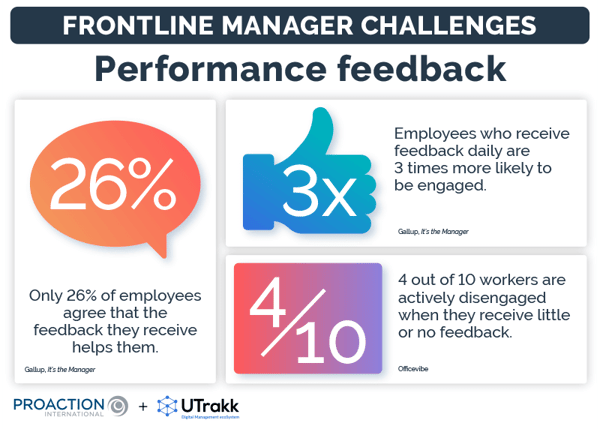
To inspire exceptional performance, managers must lead and continually review by giving meaningful feedback based on what each person naturally does best. - Gallup, It’s the Manager
Today's employees demand regular, constructive feedback on their work. Frontline managers must implement performance management processes encouraging skills development and professional fulfillment, while demonstrating objectivity and empathy.
The solutions
Here are a few ways to increase the frequency of constructive feedback to employees:
- Set up regular follow-up meetings with each employee to discuss their goals, progress, and areas for improvement.
- Provide feedback immediately when relevant, rather than waiting for an annual or monthly performance review.
- Adopt a positive and constructive approach, focusing on the employee's achievements and skills, while identifying areas for improvement.
- Offer specific training to managers on how to give constructive and effective feedback.
By implementing these solutions, managers can integrate constructive feedback into their management routine, fostering a culture of open communication and continuous improvement within the team.
The frontline leader: Architect of the company's success
With all these challenges, the role of the frontline manager is increasingly complex and demanding. Between mobilizing employees and managing time, conflict, change, and performance, they have to wear many hats, develop a wide range of skills, and be able to think in terms of both "people" and "performance".
With the support of senior leaders in management and human resources, as well as training and leadership coaching, frontline managers have every chance of successfully solving these challenges.
By investing in the development of these key players, companies have everything to gain: satisfied employees that are deeply invested in their work and more productive, and thus contributing to making the business a dynamic, healthy, and ever more successful organization.







